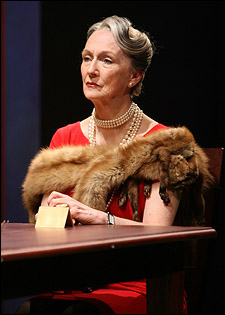
*
As you can readily imagine with Dead Man's Cell Phone, the Calls Waiting and Waiting and Waiting quickly accumulate and coagulate. One of the first, in Sarah Ruhl's new play by that name, is from Kathleen Chalfant as the mother of the deceased (T. Ryder Smith).
The role directly connects her to her past — to Playwrights Horizons, in its embryonic stage ("very pre-Andre [Bishop]"), when it was freshly founded by Robert Moss and she comprised "The Staff" — but that was another time and, literally, another place on 42nd Street.
This is her first time in Playwrights Horizons' new facility, and it's her first time back with that company since she was the understudy/matinee Sister Mary Ignatius, the Christopher Durang hard-nosed nun who explained it all for you. "Elizabeth Franz did six shows a week, and I did two," she remembers. "Then, I did it for a couple of years, between famous people."
On the other end of the Dead Man's Cell Phone is Mary-Louise Parker, an empathetic innocent who finds it ringing in a café, posts the death notice to all callers and gets herself pulled into the private life of the deceased and those of his grieving friends and family. "Sarah writes these fairytales-with-spines-of-steel," says Chalfant. "This is about what devotion is and the unexpected ways love manifests itself. Her plays have, always, many of the same characteristics — people in unusual juxtapositions, people who seem to be in perfectly ordinary circumstances but suddenly find themselves in magical circumstances.
"In this play, the space between life and death is a l
 |
||
| Kathleen Chalfant in Dead Man's Cell Phone |
||
| photo by Joan Marcus |
"One of her first plays [Melancholy Play] was done at Princeton, where she was a grad student — that's how I met her — and another one was done here at the Ohio space [Late: a cowboy song]. Both were designed by my daughter, so I've known Sarah for a long time."
Come to that, Chalfant has known everybody in the business for a long time. "I never wanted to do anything else, but I didn't do it in an ordinary way. I didn't do stock or be part of a repertory company or go to drama school. I got into theatre sorta sideways.
"I meant to be in theatre when I was in high school, but when I got to Stanford — because of a boyfriend — I studied classical Greek instead of theatre and forgot, in that way you do when you're 17, I was going to be an actor and got a degree in classical Greek." Happily, that way, she met documentary filmmaker Henry Chalfant. He put her back on the track.
In 1965, as they were returning from a trip to Mexico to start graduate school, Chalfant suddenly said out loud, "I really don't want to teach Greek to prep-school boys." Her husband-to-be said, "What do you want to do?" It was her epiphany: "Out of the blue, for the first time in three years, I said, 'I've always wanted to be an actress.' It never occurred to me I could actually do that. He said, 'Well, why don't you do that then?'"
But this was easier said than done. She moved to where her husband's work carried her, first to San Francisco, where son David was born, and then to Rome, where she studied acting (in Italian!). "I was 26 when we came back to the U.S. with a child and moved to Woodstock, where I worked in theatre. Our second child was born in the third week of rehearsals for Major Barbara. I played Barbara, but I didn't name her Barbara. She's Andromache Chalfant, the [aforementioned] set designer. It's a Greek name. She's Hector's wife and quite a tragic character actually, but we didn't think that at the time."
Two years later she entered New York theatre, through the back door, just as Playwrights Horizons was taking shape. "I went to help with the construction, which was dangerous not only for me but everybody, so Bob Moss said, 'Why don't you come into the office? Can you type?' That's my only useful skill — I can actually type — so I became his associate. His office was one of the big chairs in the lobby at The Plaza. That's where you went to talk to him."
It was while she was on the Playwrights Horizons board and helping Julia Miles establish The Women's Project at the American Place and working at Manhattan Theatre Club when it was Off-Off-Broadway that the actress in her emerged — first Off-Broadway in Jules Feiffer's Hold Me! and on Broadway in Dance With Me. When Broadway beckoned, she went to Moss, hat in hand: "What should I do? I feel bad leaving you." He was a big soldier: "You're an actress. Go and act." She's been a 24/7 actress ever since.
In fact, on her Mondays off from Dead Man's Cell Phone, she's at the Zipper Factory, playing Virginia Woolf to Patricia Elliott's Vita Sackville-West in Vita and Virginia.










